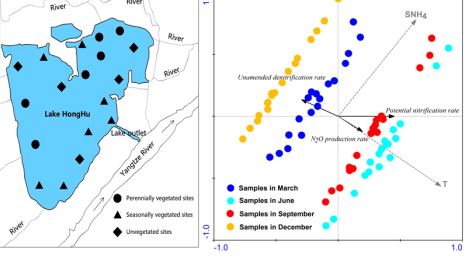
The re-establishment of submerged vegetation is recognized as an efficient approach for improving ecological functions and aquatic biodiversity. However, there is limited knowledge of the influence of submerged vegetation restoration on sediment nitrogen (N) cycling processes and associated microorganisms, which are closely associated with the N removal efficiency and self-purification capacity of lake ecosystems.
Under the supervision of Prof. LIU Wenzhi and Prof. LIU Guihua , YAO Lu from Wuhan Botanical Garden of the Chinese Academy of Sciences analyzed the spatio-temporal patterns of sediment potential nitrification, unamended denitrification and N2O production rates along a submerged vegetation gradient in the Lake Honghu of China, where submerged vegetation was largely restored by prohibiting net-pen aquaculture.
Unvegetated sediments supported higher potential nitrification rates than rhizosphere sediments of perennial or seasonal vegetation. However, the submerged vegetation absence did not significantly affect denitrification and N2O production rates.
Redundancy analysis (RDA) further revealed that sediment nitrification and denitrification were related to water quality and sediment properties but not submerged vegetation and microbial abundances.
These findings suggest that vegetation restoration in a large and shallow lake can improve water quality such as water transparency, but it may not significantly enhance sediment N removal rates and functional microbial abundance. Therefore, most attention should be paid to control nutrients export from terrestrial ecosystems.
The National Natural Science Foundation of China supported this study. Research results entitled "Sediment nitrogen cycling rates and microbial abundance along a submerged vegetation gradient in a eutrophic lake" was published in Science of The Total Environment.

Sampling sites in the Lake Honghu (Left) and results of RDA (Right) (Image by YAO Lu)

86-10-68597521 (day)
86-10-68597289 (night)

52 Sanlihe Rd., Xicheng District,
Beijing, China (100864)

